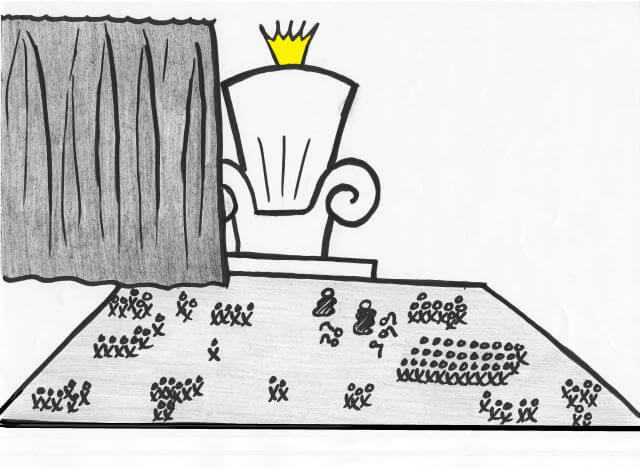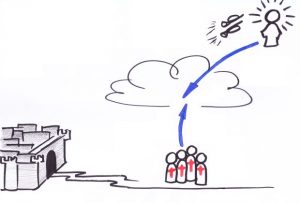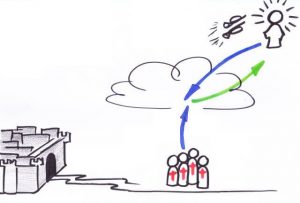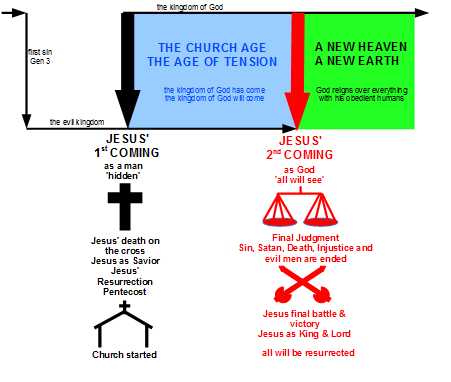CHURCH 17 – Jesus' Second Coming
Some basic facts about Jesus 2nd coming
No date
- Mth 24:30,36 “They will see the Son of Man coming on the clouds of heaven’ with power and great glory … But about that day and hour no one knows, neither the angels of heaven, nor the Son, but only the Father.”
- Mrk 13:32 “But that date or hour no one knows, neither the angels in heaven, nor the Son, but only the Father.”
- The date is unknown to men or angels. Even Jesus says he doesn’t know the hour. That may be an absolute truth, or a true statement for Jesus when he is a human on earth, but it clearly shows our greater ignorance.
- Those claiming to know what not even Jesus knows only prove their arrogance … Stay away from all ‘calculations’! Do not be fearful about ‘not having insider knowledge’. Again and again believers have been unsettled by supposed dates of Jesus’ return. The last famous one being the year 2000, but there is a long history of failed predictions.
- Examples: William Miller > 1843 or 1844, John Cumming > 1860, Edgar Wisenant 8 Aug 1988, Edgar Wisenant 9 Sep 1989, 2000, 2012, …
- Most of these never repented or apologized to the church when their predictions failed. Some even re-issued a new date after the old one had proven wrong.
- This is not harmless, because it ridicules the Word of God to outsiders and makes the believers insecure as to whether the Bible can be truly understood.
- Do not be impressed with ‘oh so biblical’ date calculations! Do not fear predictions!
It's an event that cannot possibly be missed
- Mth 24:29-31 (Mrk 13:24-27) “The sun will e darkened, and the moon will not give its light, the stars will fall from heaven, and the powers of heaven will be shaken. Then the sign of the Son of Man will appear in heaven, and then all the tribes of the earth will mourn and they will see the Son of Man coming on the clouds of heaven with power and great glory. And he will send out his angels with a loud trumpet call, and they will gather the elect from the four winds, from one end of heaven to the other.’
- The 2nd coming of Jesus cannot possibly be missed. In contrast to these verses many teachings about rapture portray it as an event that happens suddenly, to only a limited number of people, secretly. A kind of like a stealth exit.
- According to these verses, there is no way to miss Jesus’ second coming.
The 2nd coming inaugurates Christ's reign over everything
- The outcome of the 2nd coming is not an ‘abolishing of earth’ and an ‘escape to heaven’ of the believers, leaving the earth doomed, but rather it is the inauguration of Christ’s total reign over the entire creation, over all things.
- Dan 7:13-14 “I saw one like a human being coming with the clouds of heaven. And he came to the Ancient One. To him was given dominion and glory and kingship, that all people, nations and languages should serve him. His dominion is an everlasting dominion that shall not pass away, and his kingship is one that shall never be destroyed.’
- This passage is quoted by Jesus as referring to himself during his trial before the Jewish Sanhedrin. To quote this most famous and beloved messianic passage was sealing Jesus’ fate as a ‘blasphemer’, which Jesus well knew (Mth 26:63-65, Mrk 14:61-64, Luk 22:69-70).
- 1 Cor 15:24-26 “Then comes the end, when he hands over the kingdom to God the Father, after he has destroyed every ruler and every authority and power. For he must reign until he has put all his enemies under his feet. The last enemy to be destroyed in death.”
- Col 1:15-20 “He (Jesus) is the image of the invisible God, the firstborn of all creation, for in him all things visible and invisible, whether thrones or dominions or rulers or powers – all things have been created through him and for him. He himself is before all things, and in him all things hold together. He is the head of the body, the church, he is the beginning, the firstborn from the dead, so that he might come to have first place in everything. For in him all the fullness of God was pleased to dwell, and through him God was pleased to reconciled to himself all things, whether on earth or in heaven, by making peace through the blood of his cross.”
- The picture is one of Jesus reconciling all things (visible and invisible) to himself, not one of abandoning of the physical earth and going to a spiritual heaven.
- Rev 21:1 “There I saw a new heaven and a new earth.”
- Revelation leaves us with a final picture of all things restored, a new heaven and a new earth over which Christ rules and in which his humans have full part.
How to be ready? > Be faithful in your work on earth
- Virtually every passage on the 2nd coming in the NT ends with a practical application of how to be ready or what to do in the meantime:
- Mrk 13:1-27 After Jesus predicts both the fall of Jerusalem in 70 AD (Mrk 13:1-23) and his own coming (Mrk 13:24-27), he draws two practical applications. For the fall of Jerusalem he encourages the disciples to understand the signs of the time that Jesus just spelled out (Mrk 13:28-31). But in contrast to that for the 2nd coming Jesus, – after declaring that nobody knows the hour -, tells the parable of a servant who does not know at what time of the night his master will come back, so he needs to keep awake (Mrk 13:32-37). The picture is that of a faithful slave on duty.
- Mth 24 is parallel to Mrk 13. For practical application Jesus exhorts his listeners to watchfulness as nobody knows the hour (comparison: “like a thief in the night”, 1 The 5:2, 2 Pet 3:10). He also tells the parable of the wise and faithful slave. “Blessed is that slave whom his master will find at work when he arrives.” (Mth 24:46).
- 1 Cor 15:1-57 After a detailed description on the resurrection of all people at the end of time Paul concludes in 1 Cor 15:58: “Therefore, my beloved, be steadfast, immovable, always excelling in the work of the Lord because you know that in the Lord your labor is not in vain.”
- 1 The 5:8-11 Paul concludes a teaching on the 2nd coming with these words: “But since we belong to the day, let us be sober, and put on the breastplate of faith and love … For God has destined us not for wrath but for obtaining salvation through our Lord Jesus Christ … Therefore encourage one another and build up each other, as indeed you are doing.” Again the combination of being aware, faithful and obedient, assured and encouraging one another.
- 2 The 2:13-17 Paul concludes another teaching on the 2nd coming says: “God chose you … so then, brothers, stand firm and hold fast to the traditions that you were taught by us … Now may our Lord Jesus Christ himself comfort your hearts and strengthen them in every good work and word.”
- What should teaching on the 2nd coming lead to? The answer is: awareness, steadiness, confidence and faithful work on this earth now.
- Why is it, that our modern teaching on Jesus’ 2nd coming has produced almost the exact opposite: over-excitement, fear, fretting, over-focus or speculation about dates and a loss of view for the importance of faithful work on this earth? It has paralyzed believers and not encouraged them to invest into this world now. The slogan has been to ‘not polish brass on a sinking ship’. How different from Paul!
- How different is Martin Luther’s admonition: ‘If I knew Jesus comes tomorrow, I would plant a tree today’.
- Or an event from the early days of American Government: When a solar eclipse occurred during one of the Parliamentary sessions, the speaker exhorted his fellow law-makers saying: Brothers, if Jesus is not coming back, we should not let this distract us from our current work. If Jesus does come back, let him find us busy with the work. – That is totally Biblical thinking!
- So whenever the NT teaches about the 2nd coming, the conclusion is to be ready, which means to live faithful, productive, hard-working lives now, serving our fellow men, doing what God called us to do in the meantime. So:
- Do not sit around paralyzed and fearful waiting for the rapture!
- Do not believe speculations about dates! Do not teach such things!
- Do not be scared! Do not scare fellow believers!
- Paul taught about end times to assure and encourage believers, not to scare them to death … or scare them into repentance … or scare them into obedience.
- For example he concludes the passage about Jesus’ 2nd coming in 1 The 4:13-18 with the words: “Encourage one another with these words.”
- Don’t let your words or teaching on the 2nd coming produce anything other than this!
What all will happen at Jesus' 2nd Coming?
- Unlike some popular teaching, I suggest that Jesus 2nd coming is one comprehensive event which includes many aspects and has many descriptions:
- Jesus’ swift and total victory over Satan, evil spirits and evil men (Rev 19:19-21)
- Resurrection of all humans and their judgment for their actions (Rev 20:11-15)
- The termination of Satan, evil spirits, evil men and death (Rev 20:10).
- The present heavens and earth will be destroyed by fire (2 Pet 3:7).
- But also there is the total re-creation of heaven and earth (Rev 21:1) and the total reconciliation of all things, that is complete justice and peace through the total rulership of Jesus over all things (1 Cor 15:25-27)
- This far-reaching and stunning redemption – of all things physical and spiritual, visible and invisible – is described with many powerful words and word pictures:
- The whole creation will obtain freedom and be redeemed (Rom 8:19-22)
- There will be a universal restoration that God announced long ago (Ac 3:21)
- We will all be changed (1 Cor 15:51-53), referring to humans, but may well include all types of ‘bodies’ mentioned before, plants, animals, planets, stars, etc.
- All things in heaven and earth will be gathered up in Christ (Eph 1:9-10)
- all things will be put under Jesus feet (1 Cor 15:25-27, Ep 1:22)
- All things on earth or in heaven will be reconciled to Christ (Col 1:20).
- Heaven and earth will be made new (Rev 21:1).
- This is so different from our usual ‘gloom scenarios’!
- This is so different from our usual ‘flee the world and escape to a spiritual heaven’!
A word about the book of Revelation
- Much fearful teaching and many scary books claim to explain Revelation.
- Of course, Revelation is a difficult book, which needs careful study, more than can be done in this short teaching unit. But still some basic points need to be made:
- Revelation calls itself a prophecy (Rev 1:3, 10:11, 19:10, 22:6, 22:10, 22:18-19). As a prophecy the book of Revelation falls under the conditions of 1 Cor 14:3, that all prophecy must build up, edify and encourage. This means that scary interpretations of Revelation simply miss the point: Revelation is meant to build up, edify and encourage the believers. Do not interpret otherwise!
- As a prophecy the book of Revelation is like Old Testament prophecy, which is not primarily a prediction of random future events (however interesting), it is primarily giving people God’s perspective on current events, showing people what to do now, how to respond now, how to be steadfast and faithful now.
- Revelation is written to persecuted Christians of NT times in the Roman province Asia, today’s Turkey (Rev 2:10). Already one of the churches has had their first member die as a martyr (Rev 2:13). And persecuted Christians over the centuries have best understood the comfort giving nature of Revelation.


- Revelation calls itself ‘a revelation’ in Rev 1:1. The word for ‘revelation’ in Greek is ‘apocalypse’. This word (at least in English) has become a very frightful word, one that makes people shudder about all the horrible things that will happen. But the Greek word ‘apocalypse’ simply means “unveiled, made visible, revealed, made clear, the curtain removed” (like a bride’s veil is lifted after wedding vows).
- Apocalypse therefore means ‘to be made clear’, and is not meant to be cryptic, secret, only understandable by an initiate few.
- But what is Revelation a revelation of? What is it that is made clear? Here is a very compressed answer to this very important question:
- The book of Revelation does not so much try to show the ‘horrible events’ on the earth – persecuted Christians then (and of all ages) already know how horrible, how unjust, how crushing evil government, evil men and evil religion can be.
- What they need to know and see, is the greater reality of a loving and powerful God, who is in control in spite of the apparent madness of the current events.
- And Revelation wants to reveal that: take away the curtain and show the invisible reality, that – in spite of it all – God is on the throne and controls events on the world stage, and will ultimately bring them to a good conclusion:
- Evil will be terminated. Injustice will be judged. Those who lost their lives will get them back. Good will prevail, a total restoration will come. This is comfort for the suffering! This is strength and encouragement to the persecuted! When interpre-ted appropriately, Revelation is a true prophecy: building up, edifying and encouraging

Correcting fears and wrong ideas about Jesus' 2nd coming
1 The 4:13-18
- Paul assures the Thessalonians: those who die before Jesus comes back will by no means ‘miss’ the 2nd coming of Jesus, but will be resurrected first, Then those alive at that time will be ‘changed’ . All with the same effect: a new, imperishable, powerful, physical resurrection body will be given to all, like Jesus was given on the 3rd day after his death. There will be no difference of those then alive or not.
2 The 2:1-12
- The Thessalonians had received a fake letter written is the name of Paul, asserting that Jesus had already come back (2 The 2:2) … and they missed it.
- Paul reassures the Thessalonians that Jesus has not yet come back, that they didn’t ‘miss’ the 2nd coming and goes on to explain to them that quite a few things need to happen before Jesus will come back (man of lawlessness, removal of the restrainer).
- Though Paul’s additional explanations are hard and not easily understood (and very differently interpreted by different people), the basic intention of Paul in saying all this is crystal clear: to assure them that Jesus hasn’t come back yet.
1 Cor 15
- 1 Cor 15:1-34 Paul assures the Corinthians that Jesus’ bodily resurrection was a real historical event, witnessed by many people. He further asserts that if the resurrection of Jesus wasn’t real, the Christian faith should be abandoned.
- 1 Cor 15:35-58 Paul assures the Corinthians that as Jesus resurrected, all believers will be bodily resurrected at his coming, and so death will be abolished. Paul gives more details on the ‘how’ of resurrection, stressing both the continuity (we will know each other still, person-hood will not be abolished) and the superiority of the new state (an imperishable, glorious body with many powers).
Jesus coming where? A Word Study on the “Coming” of Christ
Coming = 'erchomai' G3952 - 639 occurrences in the NT
Coming = ‘erchomai’ G3952 639 occurrences in the NT
- Meaning: come, go, appear, accompany, bring, enter, …
- This word is used in many, many ways as the normal word for ‘come’. It is also used about Jesus’ first coming to the world. It is also used about Jesus’ 2nd coming in the following passages:
- Coming of the Son of Man (Mth 10:23, 16:27-28, 23:39, 24:30, 24:42, 24:44, 25:31, 26:64, Mrk 8:38, 9:3, 13:26,35-36, 14:62, Luk 9:26, 13:35, 19:38, 21:27, Jhn 14:3,18, Acts 1:11, 2:20, 1 Cor 4:5, 11:26, Heb 10:37, Rev 3:11, 16:15, 22:7,12,17,20)
- Coming of the Son of Man in parables (Mth 21:40, 24:46, 24:48, 25:6,10,13,19, 27, Mrk 12:9, Luk 12:36-40,43,45, 19:13,23, 20:16)
Coming = ‘parousia’ G3952 24 occurrences in the NT
It refers to normal people in:
- 1 Cor 16:17 “I rejoice at the coming of Stephanas and Fortunatus and Achaicus.”
- 2 Cor 7:6 “But God, who consoles the downcast, consoled us by the arrival of Titus, and not only by his coming, but also by the consolation with which he was consoled about you.”
- 2 Cor 10:10 “For they say, “His letters are weighty and strong, but his bodily presence is weak, and his speech is contemptible.”
- Php 1:26 “so that I may share abundantly in your boasting in Christ Jesus when I come to you again.”
It refers to 'the lawless one' in:
- 2 The 2:9 “And then the lawless one will be revealed, whom the Lord Jesus will destroy with the breath of his mouth, annihilating him by the manifestation of his coming. The coming of the lawless one is apparent in the working of Satan who uses all powers, signs, lying wonders.”
It refers to Jesus 2nd coming in:
- Mth 24:3 “the disciples came to him privately, saying, “Tell us, when will this be? And what will be the sign of your coming and of the end of the age?”
- Mth 24:27 “For as the lightning comes from the east and flashes as far as the west, so will be the coming of the Son of Man.”
- Mth 24:37-39 “For as the days of Noah were, so will be the coming of the Son of Man … eating … drinking… marrying… until the day Noah entered the ark. And they knew nothing until the flood came and swept them all away, so too will be the coming of the Son of Man.”
- 1 Cor 15:23 “But each in his own order: Christ the first fruits, then at his coming those who belong to Christ.”
- 1 The 2:19 “For what is our hope or joy or crown of boasting before our Lord Jesus at his coming? Is it not you?”
- 1 The 3:13 “And may he so strengthen your hearts in holiness that you may be blameless … at the coming of our Lord Jesus with all his saints.”
- 1 The 4:15 “For this we declare to your by the word of the Lord, that we who are alive, who are left until the coming of the Lord, will by no means precede those who have died.”
- 1 The 5:23 “May the God of peace himself sanctify you entirely; and may your spirit and soul and body be kept sound and blameless at the coming of our Lord Jesus Christ.”
- 2 The 2:1-2 “As to the coming of our Lord Jesus Christ and our being gathered together to him, we beg you, … not to be quickly shaken in mind or alarmed.”
- 2 The 2:8 “And then the lawless one will be revealed, whom the Lord Jesus will destroy with the breath of his mouth, annihilating him by the manifestation of his coming.”
- Jam 5:7-8 “Be patient, therefore, beloved, until the coming of the Lord. The farmer waits for the precious crop … You also must be patient. Strengthen your hearts, for the coming of the Lord is near.”
- 2 Pet 1:16 “For we did not follow cleverly devised myths when we made known to you the power and coming of our Lord Jesus Christ.”
- 2 Pet 3:4 “scoffers will come … saying “Where is the promise of his coming?”
- 2 Pet 3:12 “what sort of persons ought you to be in leading lives of holiness and godliness, waiting for and hastening the coming of the day of God.”
- 1 Jhn 2:28 “And now, little children, abide in him, so that when he is revealed we may have confidence and not be put to shame before him at his coming.”
- ‘Parousia’ is not originally a ‘Christian’ word at all.
- It was a word with clear political overtones, as it was used for the official visit of an emperor or high government dignitary coming to visit a city.
- A high-powered delegation from the city would go to meet the approaching emperor and then escort him into the city with great honor.
- The picture we modern Christians typically have in our mind is that Jesus will come, meet us in the air, and take us to heaven (middle picture).
- But careful what exactly Paul does and does not say: “We will be … caught up in the clouds …. to meet the Lord in the air; and so we will be with the Lord forever” (1 The 4:17). as illustrated by the two blue arrows (first picture). We will be “with him”. But where will he be? Good question.
- By the typical meaning of “parousia” it is not him “coming to take us to heaven” (middle picture), but rather of him (the king) coming, us going out to meet him in the air (the delegation going out to receive the king) … and then invite him with honor into the city (third picture).



- In the case of the reception of a political emperor is is a “horizontal event”, in the case of Jesus there is a vertical component added, but the two are parallel.
- So the 2nd coming means not just some “rapture”, it is the inaugurating Jesus reign over “all things”, over heaven and earth … it is the fulfillment of the Lord’s prayer “your will be done on earth as it is in heaven”.
- As modern Christians we are so used to sentences, songs and pictures of “Jesus taking us to heaven” that we are shocked by this. Yet the New Testament bears this out. We have made ‘Jesus Second Coming’ into ‘Jesus Second Departure’!
- This interpretation is further supported by the fact that in all verses where the word “parousia” is used for humans (Paul, Titus, Stephanas) the meaning is for the person coming to people, staying with them at their place.
The Basic Time Line
- The basic Time Line of the Bible is simple, rather than complicated:
- There is Jesus’ 1st coming, as a child, as a human, born to live among humans, to reveal the Father, to die and be resurrected.
- At his 2nd coming Jesus will come back as King, to put to end evil and injustice, to bring resurrection life, to abolish death, to restore all things and reign over all things for ever.

Being with Jesus before Jesus' 2nd coming
- So what happens after believers die? Basically there is a two part future awaiting believers:
- First a peaceful ‘being with Jesus’ while world history still goes on. Jesus refers to this when assuring the person dying on the cross next to him “today you will be with me in Paradise.” (Luk 23:43) and in Jhn 14:2 “I go to prepare a place for you”. The word Paradise means ‘park’, or ‘Eden’, a place of fellowship with God without sin and suffering. Good as that is, it is small in comparison with the greater to come:
- Then on Jesus’ 2nd coming: bodily resurrection or transformation, including a total restoration of all created things, followed by being part of Jesus’ kingdom forever.